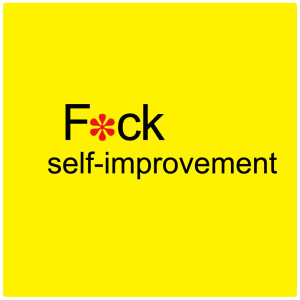Self-Improvement is Hard: An Excerpt from F*ck Feelings
Posted by fxckfeelings on August 17, 2015
Self-improvement is hard and sometimes impossible, even when we’re strong-willed and well guided.
In other words, we’re often fucked.
Neuroscience seems to show that many emotional and behavioral problems we thought were caused by bad parents or trauma are also caused by wiring that isn’t reversible. This explains why self-improvement is hard and sometimes impossible, even when we’re strong-willed and well guided. In other words, we’re often fucked.

On the other hand, while there’s much pain in incurable dysfunction, the joys of self-improvement are overrated. Strength and confidence may give you a wonderful feeling and a license to walk around in a cape and tights, but big fuckin’ deal. Real confidence comes from knowing you’ve used what limited strength you have to do what’s important. If your strength isn’t great, and as a result you have to strain harder, you deserve even more credit, assuming you’ve got the values to do something worthwhile.
If you accept that self-improvement has its limits, then you can begin to discover the nature of these limits, which you need to know if you’re going to manage them well. So the goal of pushing your potential isn’t just to improve your performance but to improve it as much as you reasonably can, given your resources, while discovering what your limits are. That way, you’ll know how much help you need and how much to compromise when you can’t do everything yourself.
Addiction isn’t the only self-destructive behavior that seems like it should be controllable but isn’t. Eating disorders, hair picking, hoarding, and procrastination are similar in that they seem like bad habits that should improve with steady effort and strong willpower, but are actually very hard to change. It’s no one’s fault, not even your mother’s. The only conclusion to draw is that many people have less control over their basic behavior than they deserve, and that it’s often hard to know how much responsibility they should bear for their actions.


